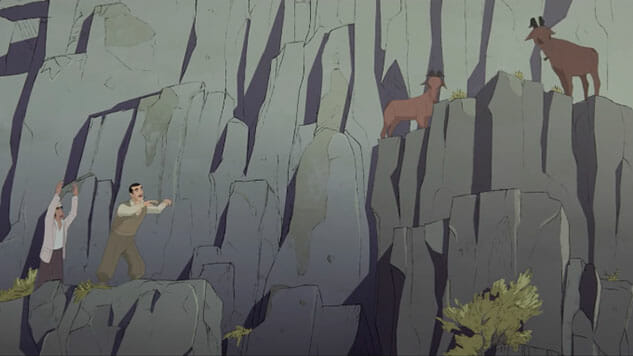Among a slew of 3D animated films and faithful-to-life but aesthetically drab work like The Lion King and Aladdin, GKIDS consistently outputs stellar, traditional cel animation, ranging from Funan, to The Breadwinner, to now Buñuel in the Labyrinth of the Turtles, a biopic-adjacent picture about Mexican surrealist filmmaker Luis Buñuel’s efforts to make his sort-of documentary Las Hurdes: Tierra Sin Pan (“Las Hurdes: Land without Bread”). If there’s an unlikelier concept for an animated movie, no one’s made it yet, though Buñuel’s a fascinating, complex subject for any kind of movie, and, if at first blush an animated project about his life feels off, the medium makes sense on further inspection. Cel animation adds a spark of unreality to the real, translating flesh and blood into a form that crackles with chimerical life.
Buñuel in the Labyrinth of the Turtles reads as whimsical, breezy even, but the easygoing veneer belies its immensity. For Buñuel, the Las Hurdes region of Spain presented a chance to bounce back after L’Age d’or, the 1930 socio-religious satire he made with Salvador Dali which the Spanish and French publics received with outrage. Las Hurdes was a land suffocated by such extreme poverty that its people didn’t even know about bread, hence the title. There’s no such obvious meaning to Buñuel in the Labyrinth of the Turtles’ own appellation, but director Salvador Simó’s account of Las Hurdes: Tierra Sin Pan’s production has ballast enough that the elusion becomes part of the pleasure.
Simó sprinkles Buñuel in the Labyrinth of the Turtles with dream sequences tuned to the keys of eccentric and dreadful, fluid nightmares coursing through Buñuel’s (Jorge Usón) imagination. Asleep, he’s a child craving his father’s approval. Awake, he’s a nuisance to his cohorts, the great anarcho-syndicalist sculptor Ramón Acín (Fernando Ramos), cowriter Pierre Unik (Luis Enrique de Tomás) and cinematographer Eli Lotar (Cyril Corral). The journey to Las Hurdes from more civilized parts of Spain is arduous: It’s a rugged, untamed country unspoiled by man, because there’s apparently naught to spoil. Getting into the valley proper requires either interminable hikes or terrifying car rides on winding roads barely acceptable for travel by donkey.
Simó’s interpretation of Buñuel contains multitudes: He’s a charmer, a condescending elitist, a brilliant artist, a pretentious snob. The film’s great strength, apart from animation quality, is its eagerness to interrogate Buñuel’s legend. Buñuel in the Labyrinth of the Turtles rejects hagiography in favor of truth. Vivid and alchemical though animation may be, Simó’s movie feels more real than any of Buñuel’s. Where he fudged key events of his work (according to Simó and his co-writer, Eligio R. Montero), Buñuel in the Labyrinth of the Turtles sticks to the facts. The film casts him in unflattering light more often than it grants him empathy: He guns down mountain goats and claims that they actually fell, he dresses in a nun’s habit in mockery of Las Hurdes’ inhabitants, he has one family stage their baby’s death for dramatic effect and he routinely wakes up his team in the dead of the morning without ceremony and an abundance of food verging on shameful considering how little there is to be found in Las Hurdes.
It’s miraculous Simó makes Buñuel sympathetic at all. Woven into Buñuel in the Labyrinth of the Turtles’ fabric are threads about his unspoken motivations. Beneath ego lies insecurity and fragility; Buñuel’s still the same boy viewers encounter in flashback and dreams, a budding artist who will forever crave paternal validation. Heart wrenching as that element is, the film breaks from biopic expectations by denying Buñuel clemency for his worse merits. It’s more interested in understanding. Simó “gets” Buñuel’s drives, and his animation lends the story a layer of romanticism while emphasizing that talent isn’t a hall pass. Buñuel in the Labyrinth of the Turtles treats genius as a knottier idea. Las Hurdes: Tierra Sin Pan is a masterpiece, sure, but “masterpiece” takes on layers of new meaning once we see how the sausage is made.
Surprisingly, Simó keeps the experience light, in part a consequence of the movie’s 70-minute running time and in part a consequence of his platform. Animation affords the film exaggeration imparting both comic effect and gravity to its plot. The results dazzle. They’re also sobering. Simó achieves a lot with a little. Most of all, he reminds viewers of cel animation’s delights at a time when a reminder is sorely needed.
Director: Salvador Simó
Writers: Salvador Simó, Eligio R. Montero
Starring: Jorge Usón, Fernando Ramos, Luis Enrique de Tomás, Cyril Corral
Release Date: August 16, 2019
Boston-based culture writer Andy Crump has been writing about film and television online since 2009 (and music since 2018). You can follow him on Twitter and find his collected writing at his personal blog. He is composed of roughly 65% craft beer.
